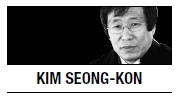What is the role of universities? What purpose do the humanities serve in colleges and society? Again, I brood over these fundamental questions as I hopelessly observe the changes taking place at Korean universities today.
 Take a university in Seoul, for example. As soon as the university’s administration was taken over by a big corporation, it underwent a radical transformation so that it could train students to work for big businesses after graduation.
Take a university in Seoul, for example. As soon as the university’s administration was taken over by a big corporation, it underwent a radical transformation so that it could train students to work for big businesses after graduation.
“What on earth do they teach at college?” Korean businessmen often complain. “College graduates don’t have any prior knowledge of their work. So we need to train them from scratch.” They take potshots at the humanities as well: “What’s the use of the humanities? It’s totally irrelevant to what we do at companies.”
Granted they have a point. College is different from the corporate world. It would be a grave mistake, if they tried to transform the university into a big corporation, confusing the two radically different institutions. College is not a place where students are trained to work for a company. Neither is it a place where students prepare for job interviews and exams. Besides, training in the humanities is crucial to learning work ethics and business morality.
College is a place where students are exposed to liberal education and are trained to become cultured people who can acknowledge differences and appreciate cultural diversity. It is also a place where you learn the value of humanity and humanism. At college, you study foreign languages, literature, history and philosophy, all of which are disciplines that teach you how to understand others and the world, and to broaden your horizons. Here, you build up critical thinking and learn to embrace others and cultivate your mind. If you want to become a professional, you should enter graduate school.
Originally, colleges were established to impart learning about theology, law, medicine and the humanities. That is why there are no colleges of engineering at most Ivy League universities even today. I have just returned from the University of Chicago where I found the Humanities buildings standing proudly at the center of the campus in front of the main library. All other colleges were clustered around it. It was obvious how much the university valued and respected the humanities.
On the contrary, in Korea, latecomers such as engineering and business administration seem to dominate the universities, driving the humanities out of the tent. This inversion of civilization is lamentable. Korea is supposed to be a Confucian society where the humanities are held in high esteem. Sadly, however, we have to stand by helplessly today as colleges and universities turn into prep schools or assembly lines for corporations, leaving no room for the humanities.
I have always been in the vanguard of university reforms, especially in the humanities. I have persistently called for reform in the humanities courses so they can contribute to society. It is undeniable that the humanities need to get out of the ivory tower and venture into the street to benefit ordinary people. However, what we are witnessing today is far from such ideal reform.
Look around and you can find numerous signs that our college education has largely failed. For example, we seldom acknowledge ideological or cultural differences and antagonize those who are different from us. We seriously lack the ability of critical thinking and appreciating cultural diversity. Rather, we become emotional easily and do not hesitate to resort to violence. Moreover, we are often overtly nationalistic and jingoistic. All of these indicate that we have disparaged the humanities and liberal education at colleges.
Currently, the same thing is happening inside the government as well. The Korean people are eager to see one of their writers win the Nobel Prize for Literature in the near future. If so, the role of the Literature Translation Institute of Korea is vital because it supports the translation and publication of Korean literature into over 30 languages worldwide. Yet the Ministry of Strategy and Finance, following suggestions from its civilian advisory committee, is reportedly considering merging the LTI Korea and the Publication Industry Promotion Agency of Korea in order to reduce expenditure. However, the two institutions have virtually nothing in common and thus the result of the merger will be disastrous.
Ever since her inauguration, President Park Geun-hye has constantly preached cultural prosperity and dissemination of the spirit of the humanities. Clearly, then, the inconsiderate attempt to merge LTI Korea and PIPAK will have the opposite effect of what she wants and promises.
Once again, we witness an example of bad coordination between government institutions. We hope the Finance Ministry withdraws this half-baked scheme and finds other efficient ways to save money. We cannot measure culture and the humanities with money.
Like other advanced countries, we should value and esteem the humanities. This is the basic requirement for any civilized society.
By Kim Seong-kon
Kim Seong-kon is a professor emeritus of English at Seoul National University and president of the Literature Translation Institute of Korea. ― Ed.



